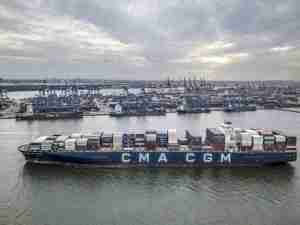"Dirty diesel trucks are a major source of port-related air pollution and present an unacceptable health risk to the public," said Port Executive Director Richard D. Steinke. "The Clean Trucks Fee, if approved by the Board, would generate $1.6 billion to help fund cleaner trucks and reduce air pollution."
The proposed fee would place a $35 charge on every loaded cargo container entering or leaving the Ports by short-haul (or "drayage") truck beginning June 1, 2008. The fee would not apply to containers entering or leaving the Ports by train and would end when the fleet of drayage trucks meets Clean Air Action Plan (CAAP) requirements in about 2012.
In November the Long Beach and Los Angeles Boards of Harbor Commissioners approved a ban on old, dirty trucks that call at the ports. The regulation will result in an 80 percent reduction in emissions from drayage trucks by 2012. The ban will be phased in, beginning October 1, 2008 with a ban on all trucks built before 1989. By January 1, 2010, only trucks built after 1993 will be allowed, and by January 1 2012 all trucks must meet 2007 federal Environmental Protection Agency standards.
"The ports do not own or operate the drayage trucks that serve port terminals," Steinke explained. "However, to achieve the aggressive clean-air goals outlined in the Clean Air Action Plan, we believe that a progressive ban on dirty trucks, followed by the proposed Clean Trucks Fee, would be the most direct way to cut air pollution and reduce public health risks."
Importantly, Steinke said, the Port will use the funds to ensure that the old, polluting trucks will be scrapped and taken out of circulation, rather than continuing to work outside the ports.
The Port of Los Angeles is considering a similar fee, so the Clean TrucksFee would apply to the entire San Pedro Bay. The fees would be collected bythe ports' shipping terminals, and the trucks would be monitored for compliance by radio frequency tracking devices or similar identification technologies.
All funds collected by the two ports would be used for the replacement of about 16,800 trucks by 2012 with clean diesel trucks, trucks fueled by liquefied natural gas (LNG), or other approved technologies that can achieve the 2007 standard adopted in the CAAP.
"We acknowledge that this fee will result in additional costs to cargo owners and may ultimately increase slightly the cost of goods," Steinke said. "However, the ports cannot continue to effectively move goods without reducing air pollution and public health risks."
The Board of Harbor Commissioners will meet Monday, December 17, at 1 p.m. to consider adopting the truck fee. The meeting will be at the Port Administration Building, 925 Harbor Plaza in Long Beach, and broadcast live on the web at www.polb.com.








